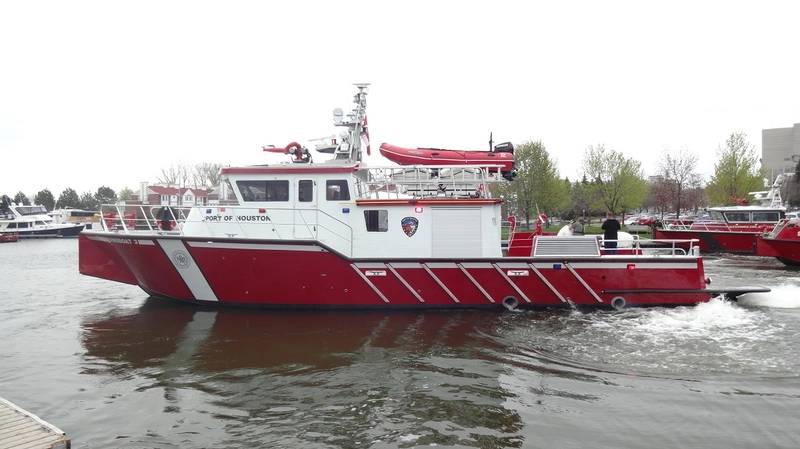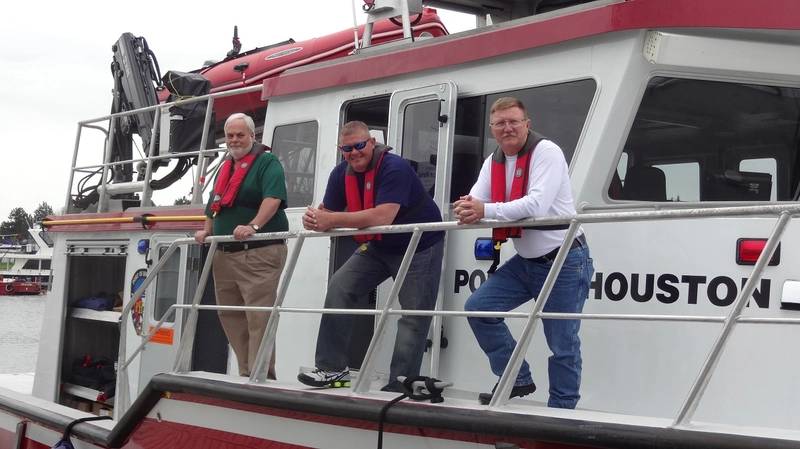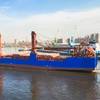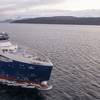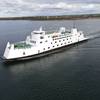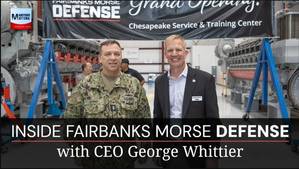Emergency Response Vessel Completes Houston’s New Fleet
A two-week voyage through four Great Lakes and the Mississippi River will bring to the Port of Houston Authority’s firefighting team the third of three new, high-performance emergency response vessels.
“The Port of Houston is one of the nation’s busiest ports, and protecting this national asset is essential to the economic well-being of Houston, Texas and the nation,” said Port Authority Executive Director Roger Guenther. “This vessel completes our new fleet, providing our firefighters with the advanced equipment needed to help save lives and property along the Houston Ship Channel.”
The Port of Houston Fire Department operates three fire stations, strategically stationed along the 52-mile-long Houston Ship Channel. Certified emergency professionals respond to marine and land fires and other emergencies along the upper ship channel.
A four-member crew, which includes two from the Port of Houston Authority’s Fire Department, is escorting the vessel home to Houston. The voyage is being made by Assistant Chief Mike Oder, Sr. a 34-year veteran of the Port Authority’s Fire Department, and Assistant Chief Jason Roberts, a 13-year veteran of the firefighting team. They are a part of a department of highly trained firefighters and Hazardous Materials Response Teams. The firefighters are certified by the state of Texas as Structural Firefighter, Marine Firefighter, HazMat Technician and Emergency Medical Technician (EMT). All pilots and captains are licensed U.S. Coast Guard mariners.
The emergency response vessel journey is scheduled to take the following course from Lake Ontario and Lake Erie to Detroit, Mich. (May 16) and then across Lake Huron and Lake Michigan to Chicago, Il. (May 18). From Chicago, the journey continues on the Cumberland River to Peoria, Il. (May 19). Then following the Illinois River, the fireboat sails on to St. Louis, Mo. (May 20), where it will enter the Mississippi River and continue with stops in Memphis, Tenn. (May 22), Vicksburg, Tenn. (May 23) and from New Orleans (May 23). A final stop will be made at Galveston, Texas (May 24) before arriving at the Port of Houston on about May 28.
The ship will be piloted on the trip by Captain Ron Peddle, an owner of MetalCraft Marine with 33 years of experience piloting ships and 35 years of building boats.
The Firestorm 70
The new Firestorm 70 is a state-of-the-art command center and high-speed response vessel. Built by MetalCraft, each fireboat has powerful quad diesel inboard engines to propel the vessel at a swift 45 knots top speed. The current fleet clocks in at 14 and 16 knots. Such an improvement in speed is important when providing fire protection for the ship channel. The new vessels are highly maneuverable, can make quick stops and change direction within three boat lengths.
Part firehouse, part boat, the vessel enables the crew to stay on station for extended periods. The cabin includes a primary care berth with four secondary berths in the cuddy. Portable berths can be positioned in the aft equipment cabin to handle injuries during incident.
Four firefighting pumps can produce flow meter results of 13,600 gallons per minute (GPM) at 150 pounds per square inch (PSI) and 17,000 GPM at 130 PSI and stream up to 450 feet with a roof-mounted Stang monitor. This is three times the discharge rate of any of the Port Authority fireboats being retired. As a shore hydrant, the FireStorm 70 can pump an impressive 7,000 GPM at 70 PSI through 1,000 feet of hose from a 5” Storz outlet before staging pumps are required.
Each fireboat is 70’10” long with a breadth of 22’10” and a draft of 34 inches. Funds for these vessels come mostly from federal grants to replace the three aging fireboats commissioned in 1973 and 1983.
“The entire MetalCraft team is honored to have been given this contract by the Port of Houston Authority,” said Michael Allen, General Manager of MetalCraft Marine. “Under the guidance of Project Manager Jay Milner and Design Manager Ryan Hunter, our team of craftsmen put in over 20,000 hours to build this industry-leading fast response Firestorm 70.
“During the build process, we worked closely with many people from the Port of Houston Authority and got to know them well. It is obvious that they take great pride in their very important roles, and we are proud to be building our most well- equipped Firestorm for them. Our goal is to provide the perfect boat for each of our customers, and we hope the Port of Houston Authority feels we have succeeded.”
MetalCraft Marine is a fully integrated designer and manufacturer of custom high-performance fire, rescue, patrol, research and other specialized work boats. The business was established in 1987 and is now a leader in the design and manufacturing of aluminum water-jet propelled craft with over 550 hulls built to date. The firm’s customers include the U.S. Coast Guard, U.S. Navy and Panama Canal Authority.
History
In 1924, a fire in the hold of a steamship carrying cotton prompted the Houston Fire Commissioner to declare that the Port of Houston needed adequate firefighting apparatus to attack fires from water as well as land. A bond election to pay for the city’s first fireboat passed with a wide margin. This election occurred just one day after a fire along the banks of the Houston Ship Channel spread to oil on the water and burned for more than two hours, with flames as high as 40 feet.
As a result, the fireboat Port Houston was built in 1925 and delivered the following year to the delight of thousands of spectators watching its arrival. The following day, another 4,000 citizens turned out for a demonstration of the fireboat pumping water.
In 1950, a new replacement fireboat, the Captain Crotty, was purchased, christened and put into service. The crew fought five ship fires and six refinery fires in the boat’s first year of service. In fact, at a fire at the General American Tank Storage Terminal, the fireboat spent 44 continuous hours at the scene, pumping for 36 hours nonstop.
Houston Ship Channel industries began to install manifolds on their docks in the 1950s to ensure that water would reach incidents at their facilities. The Channel Industries Mutual Aid group was also formed at this time. In 1971, the state legislature gave the Port Authority specific duties that included providing "for the prevention, detection, control and fighting of fires and explosions on and adjacent to the waterways, channels and turning basins within its jurisdiction."
With such increased responsibility, fire-fighting capability had to be improved. The fireboat Captain W.L Farnsworth was acquired in 1973. In 1981, the decision was made to retire the Captain Crotty and purchase two newer fireboats, the J.S. Bracewell and the Howard T. Tellepsen.
All three retiring fireboats have done their share of hazardous and heroic duty.
portofhouston.com
metalcraftmarine.com





